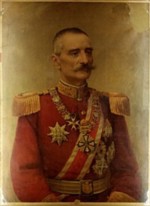In September 2019 we left Turkey by air, to continue our trip north along the Adriatic, in the Balkans, to Austria, with a brief side trip to Bratislava in Slovakia.
'The Balkans' is a geo-political construct named after the Balkan Peninsula between the Adriatic and the Black Sea.
According to most geographers the 'Balkans' encompasses the modern countries of Albania; Bosnia and Herzegovina; Bulgaria; Croatia; Greece; Kosovo; Montenegro; North Macedonia; Serbia; and Slovenia. Some also include Romania.
The Balkan Peninsula - from Google Earth
The Balkan Peninsula was among the first regions on Earth to be civilised. The ancient Vinča culture of the area developed Old European Script, the oldest form of writing known, and clay tablets have been found in the area dating back to around 5,300 BCE.
Consequently, it is a much contested geopolitical area, prized by conquerors and by those who want to capture the hearts and minds of their followers.
In modern times it was such a struggle that led to the First World War and more recently to the ethnic and religious wars that took place in Bosnia, Herzegovina and Kosovo between 1992 and 1999.
While it has from time to time been unified under a single strong emperor; king; or 'democratic' leader, it is more often best described as the brittle shards of a once whole vessel, shattered by internal disunity and differences, hence the dictionary term 'balkanisation': 'to divide into small states hostile to one another'.
The fellow to the side in the regal outfit is Peter the First of Yugoslavia, the King under whom Yugoslavia was created in October 1918 when the Austro-Hungarian Empire and the Ottoman Empire were dismembered, as a result of batting for the wrong side in the First World War. In his early years Peter had fought against the Ottomans as a guerrilla.
I apologise to all those who treasure their newfound independence but I struggled to find a figure common to most. An alternative might have been Tito - too soon?
After the Second World War, and the Germans were defeated again, Tito took his place as President of the Socialist Federal Republic of Yugoslavia that comprised: Bosnia and Herzegovina; Croatia; Montenegro; North Macedonia; Serbia and Slovenia.
Bulgaria and Albania were also 'liberated' by the Soviet Union in 1945 and in 1946 the 'People's Republic of Albania' and the People's Republic of Bulgaria became independent Communist States and members of the Warsaw Pact. Bulgaria overthrew the Communists in 1990 establishing democratic elections and a market economy but it has struggled and is at the bottom of the European Union development table.

